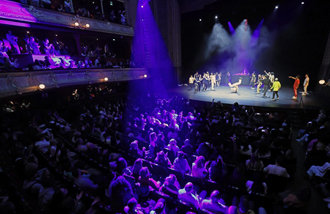Korean politics needs trust process
Korea is apparently not alone in that politics is a burden to the people. According to Broken Politics, a report released by the Brookings Institute in March 2010, 86 percent of Americans believe that the federal government is broken. It says the U.S. has a weak capacity for leadership, high political polarization, massive citizen cynicism, superficial media coverage, and limited understanding of difficult political issues, and this perfect storm of failure makes it nearly impossible to address either short- or long-term problems facing the U.S. Though three years have passed since the report was released, many political experts still agree on those points. U.S. politics does not seem to be far different from ours.
Lack of trust in Korean politics would be a more serious problem, if any, compared to the U.S. It has been widely believed that ascertaining information behind a certain political incident is a path to truth, not facts, and imagination prevailed facts. In other words, a plausible conspiracy determines peoples perception structure on a political incident. Once the perception structure is determined, people select or distort information to interpret it based on the structure.
Political conspiracies dominated our perception and put us into a chaos for a long time in many incidents ranging from the sinking of the naval corvette Cheonan in 2010 to the theory that South Korea invaded North Korea first during the Korean War. All consequences have causes. The authoritarian regimes before democratization censored the media and distorted information to misguide the public, which now hinder people from giving full trust to information by the government or power organizations. Unfortunately, succeeding democratic governments were not open enough to give trust to the public.
Before President Park Geun-hye was sworn in, I once wrote in a column that I hope the new administration does nothing for the first six months. It is because previous administrations were faced with the public backlash for pushing for half-baked policies out of strong desire to make an achievement, resulting in plummeting approval rating for presidents. President Park has not proposed aggressive policies yet, while maintaining an approval rating of over 60 percent. One of the reasons of the high approval rating would be probably because of a high score in the symbolic meaning of trust, which the president stresses. Now, however, is time to seek a qualitative change in trust by moving towards trust in a more open leader beyond the principle-based trust.
President Park stressed in her speech to the National Unification Advisory Council on Wednesday that North Korea should abandon its nuclear weapons and reach out to a hand of trust. She said the recent change in North Koreas attitude was the result of her administrations consistent North Korea policies, suggesting a possibility of larger cooperation based on trust between the two Koreas. At the end of her speech, she mentioned the need to address mistrust and conflicts in domestic politics. A research showed that Korea has the second highest level of social conflicts among the members of the Organization for Economic Cooperation and Development, and more than 200 trillion won (179.9 billion dollars) are incurred for economic losses. This manifests the poor trust level in our society.
The trust process, which the president stresses in North Korea policies, should be also applied to domestic politics. Hopefully, the president could show her patience and broad-mindedness as she did to North Korea. The format whether it is a bilateral meeting between the president and the main opposition party chairman, or a three-party or a five-party talk cannot be more important than making an opportunity to create a consensus among politicians. If a format of a meeting causes lack of discussions, a longer meeting or a different format of meeting could be an alternative. A series of meetings would be more efficient than a one-time event meeting.
What people want is a front-page article that the president and the opposition party leader are on the same page over state affairs and solutions and their photo with bright smiles. The reason the National Assembly fails to agree on settling budget accounts and hold ruling-opposition summits is that politicians do not have minimal trust and respect for each other. Or it must be because of selfish politicians who believe they have nothing to lose in this deadlock.
A system or a form does not determine the level of democracy. What matters are the peoples involvement and the governments ability to address problems. In all democracies, it is universally stressed that a political leader should create an opportunity of a dialogue and various discussions are crucial to solve problems. It is necessary to remind that the essential element of modern democracy is the governance based on encouraging peoples participation and discussions. One-sided policy-making -- like hurriedly preparing measures within two weeks at the presidents remark that real estate measures are needed is neither democratic nor efficient.







